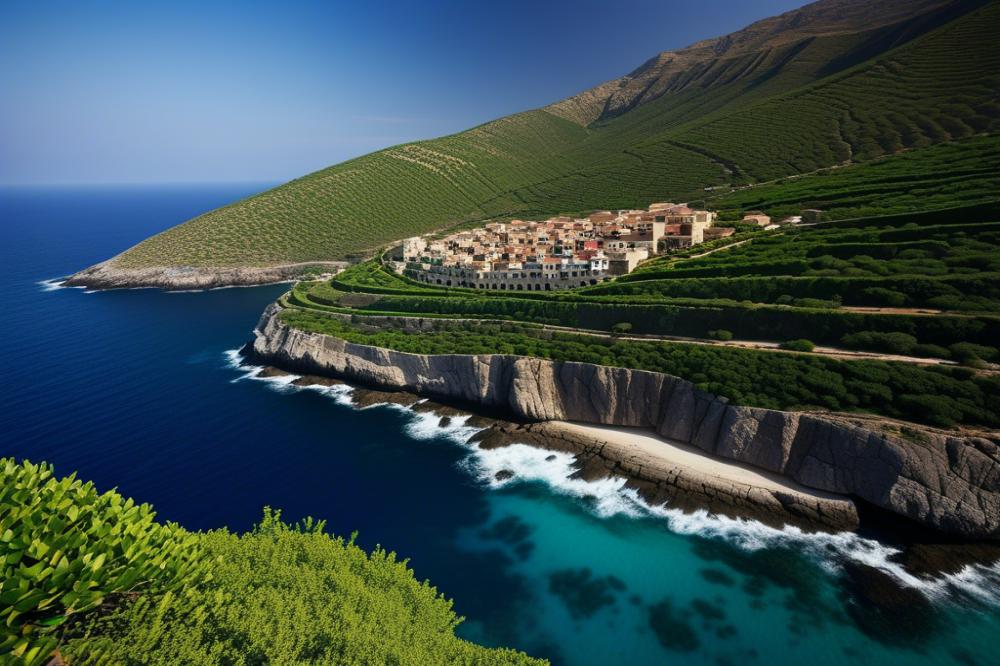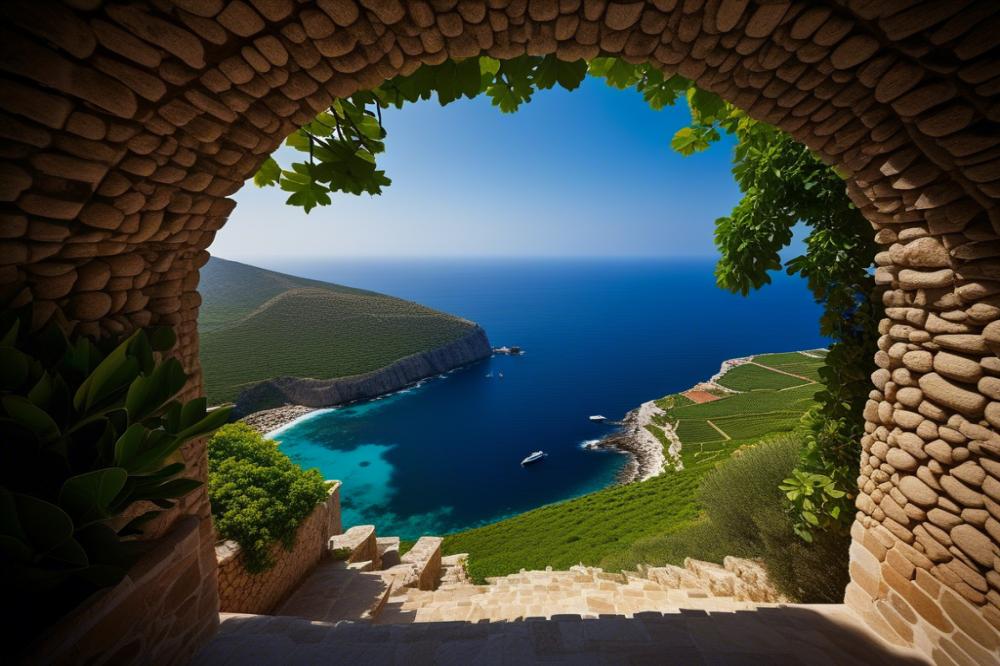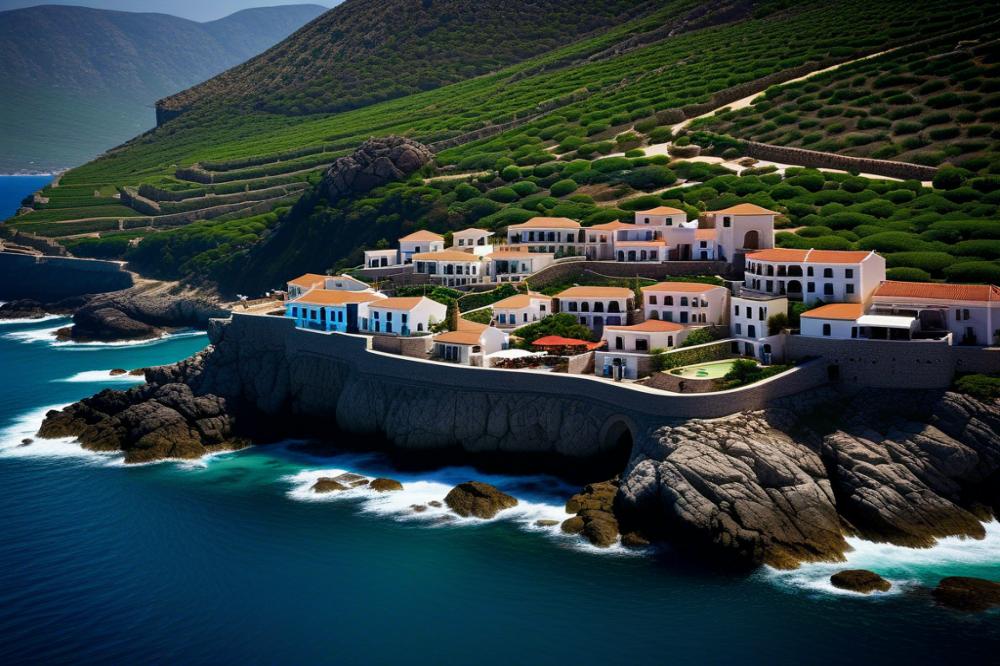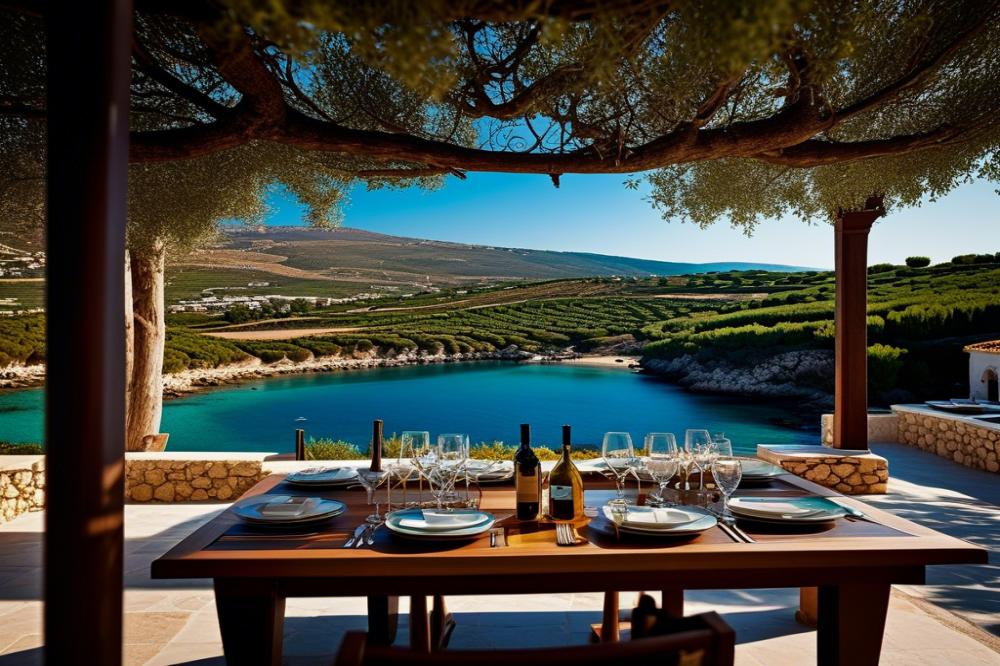Exploring the Unique Cuisine of the Mani Peninsula
The Mani Peninsula, located in the Peloponnese region of Greece, is a place rich in history and natural beauty. Known for its rugged mountains and stunning coastlines, this area has a charm that attracts many travelers. For centuries, the Mani has been a crossroads of cultures, which has greatly influenced its culinary landscape. The traditional villages nestled here paint a picture of a time long past, where customs and flavors merge in delightful ways.
Culinary travel in Greece holds great significance. Travelers seek authentic experiences through food. Each region tells a story, and what we eat often reflects deeper cultural roots. As visitors journey through the Mani, they discover not just meals but also the rich heritage of the land. Food becomes a bridge connecting people with the past. Local ingredients, family recipes, and cooking techniques that have stood the test of time contribute to a profound travel experience.
Delving into the cuisine of this region reveals intriguing flavors and dishes. A variety of fresh ingredients such as olive oil, olives, and local herbs stand out. The Mediterranean climate allows for vibrant vegetables to thrive, enhancing each meal. Iconic dishes include slow-cooked meats and hearty stews made from seasonal produce. The combination of these elements creates meals that are both comforting and flavorful. It’s not just about eating; it’s about savoring a tradition that has shaped the lives of those who call the Mani home.
Ultimately, culinary exploration in the Mani Peninsula goes beyond mere foods; it uncovers histories and connections. Authentic recipes tell stories of generations past. Visitors will find that every bite offers a taste of the local culture. As you enjoy these dishes, each one invites you to #anchor_text_1# and understand the essence of this remarkable place. Locals take pride in their culinary heritage, and sharing it with visitors is a celebration of community. So, as you plan your journey, keep your taste buds ready for an adventure like no other. Discovering the flavors of this peninsula is truly an experience worth savoring and remembering. Don’t miss out on the chance to enjoy #anchor_text_2# that brings the region to life.
The Rich History of Mani’s Cuisine

The food culture of the Mani Peninsula is deeply rooted in its history. Over centuries, various civilizations left their mark on local dishes. From ancient Greeks to later Ottoman influences, each group contributed elements that shaped the way the people cook today. These historical influences created a rich tapestry of flavors and techniques.
Traditional food practices are reflective of the area’s heritage. Families have passed down recipes through generations, keeping alive the art of cooking. Many dishes are made using methods that have changed little over time. For instance, the use of local herbs and wild greens highlights the connection to ancestral cooking. This preservation of old recipes is vital for maintaining cultural identity.
Geography’s Impact
Geography plays a significant role in shaping what people in Mani eat. The rugged terrain and coastal access provide a variety of ingredients. Fishing is a common practice, ensuring fresh seafood is always available. Olives, citrus fruits, and aromatic herbs thrive in the region, influencing many dishes. Local farms contribute vegetables that are essential to Mani’s meals.
Weather also affects the types of food prepared. Hot summers mean lighter, refreshing dishes, while colder months call for heartier meals. Cooking reflects the environment, as people use what is at hand. You’ll often find stews and roasted meats, which help warm chilly evenings. Such dishes offer insight into life on the peninsula.
Community gatherings often revolve around food. Families gather to share meals during festivals, celebrating their shared heritage. These occasions allow for storytelling, where recipes originate and evolve. The kitchen serves as a hub for connection, bonding over the shared experience of cooking and eating.
Signature Dishes of the Mani Peninsula

Overview of Key Dishes
The Mani Peninsula is famous for its rich culinary heritage. One of the standout dishes is Moussaka, a layered casserole made with eggplant, minced meat, and béchamel sauce. Another favorite is Souvlaki, which features skewered meat that is grilled to perfection. The region also boasts a variety of fresh seafood dishes, often enjoyed by locals. The flavors of the land shine through in dishes like Lahanosalata, a refreshing cabbage salad that complements heavier meals.
Ingredients That Define Mani’s Cuisine
Olive oil is a staple in most preparations, lending a distinct flavor to many meals. Additionally, herbs like oregano and thyme are prevalent, enhancing the freshness of the dishes. Fresh vegetables play an important role, and locally sourced ingredients make meals vibrant and wholesome. Popular proteins include lamb, goat, and various types of fish sourced from the Mediterranean waters. Cheese, especially feta, adds creaminess and tang, making it a common addition in various recipes.
Preparation Methods Unique to the Region
Traditional cooking methods in the Mani include slow roasting and grilling over open flames. This technique allows for a deep infusion of flavor, especially in meats. Many households still follow centuries-old recipes, ensuring the authenticity of each dish. Simmering stews with aromatic spices also showcases the culinary creativity of the area. Furthermore, fermentation of certain ingredients adds depth to dips and spreads, such as tzatziki.
Local bakeries prepare hand-crafted breads that often accompany meals. Each method brings a story, highlighting the culture of the Mani Peninsula. The focus on simple, fresh cooking methods means meals celebrate the ingredients rather than mask their flavors. This philosophy creates dishes that are both hearty and satisfying.
Local Ingredients and Traditional Farming

The Mani Peninsula boasts a rich agricultural tradition that has stood the test of time. Farmers in this region still practice methods passed down through generations. They adopt techniques that respect the land while embracing the Mediterranean climate.
Olive oil holds a prominent place on local tables. This golden liquid is not just a cooking essential; it embodies the cultural heritage of Mani. Olives are harvested from ancient trees, some of which are centuries old. The careful pressing of these olives produces oil that is flavorful and versatile.
Herbs grow abundantly in the region. Oregano, thyme, and rosemary flourish in the wild, infusing dishes with distinctive flavors. These herbs are often picked fresh and used in recipes, highlighting the connection between food and the land.
Local farmers also cultivate a variety of vegetables. Tomatoes, peppers, and eggplants are just a few examples. These vegetables thrive in the warm climate, offering vibrant colors and fresh tastes. The soil, enriched by the sun, provides excellent conditions for growing produce.
Food production in Mani relies heavily on the Mediterranean climate. Warm, dry summers and mild, wet winters create an ideal environment for agriculture. This climate allows for a longer growing season compared to many other areas.
In summary, the blend of traditional farming practices, emphasis on local ingredients, and favorable weather conditions deeply influences the culinary landscape of the Mani Peninsula. The authentic flavors found in local dishes reflect the farmers’ dedication to their craft.
Dining Experiences in the Mani Peninsula

The Mani Peninsula is known for its vibrant dining scene. Traditional tavernas can be found dotting the landscape. These establishments offer a cozy, welcoming atmosphere. Often family-owned, they reflect the local culture and history. Wooden tables, blue-and-white checkered tablecloths, and rustic decor create a charming setting. Diners can expect to share laughs and stories while enjoying a meal.
Atmosphere of Traditional Taverns
Those who visit often find themselves enchanted by the sounds of clinking plates and soft chatter. Many tavernas feature outdoor seating, allowing patrons to enjoy the Mediterranean breeze. Locals frequently gather here, and this brings a sense of community. Aromatic dishes fill the air, enticing visitors as they walk by. For many, this is not just a meal; it’s an experience.
Fine Dining vs. Casual Eateries
While traditional tavernas shine with charm, the Mani Peninsula also offers fine dining options. These restaurants present a more sophisticated atmosphere and dishes. Elegant presentation and high-quality ingredients take center stage. However, casual eateries remain popular among both tourists and residents alike. They provide quick, hearty meals without the frills. The focus in these spots is often on the food rather than the ambiance.
The Role of Family-Run Establishments
Family-run places play a crucial role in keeping culinary traditions alive. Recipes passed down through generations help maintain the region’s heritage. Memories and stories come with every dish served. Many visitors appreciate the personal touch these establishments offer. Dining in such a place feels different; it feels like coming home. Chefs are often willing to share their knowledge about local ingredients, making each meal memorable.
Overall, the dining scene in the Mani Peninsula is diverse. Whether enjoying the bustling atmosphere of a taverna or indulging in fine dining, one can savor the local flavors and warmth. Travelers leave not just with a full belly, but with a deeper appreciation for the rich culture of the area.
Recommended Culinary Tours and Experiences
Travelers seeking an authentic taste of the Mani Peninsula will find numerous guided food tours available. These tours spotlight local dishes that reflect the area’s rich cultural heritage. Tour guides share stories about the origins of each dish, adding a personal touch to the experience. Participants often sample traditional recipes that have been passed down through generations. Expect to taste aromatic herbs and fresh ingredients that define the Mediterranean diet.
In addition to tours, cooking classes provide another way to delve deep into local cuisine. These classes offer hands-on opportunities for beginners and seasoned cooks alike. Attendees learn to prepare key recipes, working alongside local chefs who reveal secrets of their culinary craft. Engaging with these experts transforms a simple meal into a balanced feast. Many classes also focus on the importance of local ingredients, which adds a personal connection to food preparation.
A visit to local markets is also essential for any food lover. Markets vibrate with energy and atmosphere, showcasing a variety of local products. Vendors proudly display their goods, including olives, cheeses, and cured meats. Browsing through the stalls allows individuals to interact with locals, gaining insights into traditional practices. Seasonal food festivals further enhance the experience, featuring cooking demonstrations and tasting events. These celebrations highlight the region’s culinary identity in a lively environment.
Each of these activities presents opportunities to learn more about the region’s food culture. Culinary adventures and experiences make it easy for anyone to connect with Mani’s gastronomic traditions. By exploring diverse options, visitors will undoubtedly take away unforgettable memories of their culinary journey.
The Role of Food in Mani’s Culture
Food holds a central place in the customs and traditions of the Mani Peninsula. Local meals tell stories passed down through generations. Many dishes reflect the history and the natural landscape that surrounds the area. Fresh ingredients often come from the sea and the land. This connection to the environment shapes the culinary identity of the region. Celebrations often revolve around shared meals, showcasing the importance of food in community gatherings.
Festivals and Events Centered Around Cuisine
Numerous festivals in Mani highlight the rich culinary heritage. The annual olive oil festival is just one example. Locals come together to celebrate the harvest, showcasing the prized liquid gold of the region. Traditional dances, music, and culinary demonstrations fill the air with joy. Visitors can sample various olive oils and learn about their production. Other events, like the summer wine festival, also bring people together. Here, wine tastings and grape-based dishes take center stage, offering a glimpse of the local lifestyle.
Connection Between Hospitality and Culinary Practices
Hospitality in Mani is deeply intertwined with food. When a guest arrives, sharing a meal becomes a way to show respect and warmth. It’s more than just serving food; it’s about creating a welcoming environment. Traditional dishes are often prepared with care, symbolizing love and effort. Locals take pride in their cooking skills, often passed down through family lines. Recipes are not just guidelines; they are a heritage worth preserving. Sharing food helps to build friendships and strengthen community ties. Thus, the act of dining becomes a heartfelt connection among neighbors and visitors alike.
Final Thoughts on Culinary Exploration in Mani
The Mani Peninsula offers an inviting blend of flavors that truly sets it apart. Notable dishes like olive oil-drizzled salads, savory moussaka, and the fragrant spices of local meats showcase the richness of this region’s culinary identity. Each bite tells a story, connecting travelers with the land’s history and traditions.
Travelers will find joy in exploring the local markets, where fresh produce and artisan products abound. The opportunity to taste and experience traditional cooking techniques brings the cuisine to life. Visitors can savor homemade cheeses and delightful pastries, each representing the heart and soul of Mani.
Encouraging you to seek out these culinary treasures, remember that food is a great gateway to any culture. Enthusiasts of gastronomy should embrace the adventure of tasting local specialities, engaging with friendly vendors, and perhaps even participating in cooking classes. The experience goes beyond mere sustenance; it deepens your appreciation for Greek heritage.
Culinary travel in Greece is an enriching journey. Those who indulge in the flavors of the Mani Peninsula will not only enjoy unforgettable meals but also foster connections with the people and places of the region. So, pack your bags and prepare for a flavorful adventure. Bring your curiosity and an appetite for discovery; the road through Mani is waiting.
In conclusion, immerse yourself in the culinary wonders of Mani by venturing into its vibrant food scene. This journey will surely leave a lasting impression. Not only will you taste amazing dishes, but you’ll also gain memories that extend far beyond the plate. Regions like this one invite you to experience their culture in the most delicious way possible. Don’t miss a chance to explore #anchor_text_3# or enjoy the local vineyards at #anchor_text_4#.



